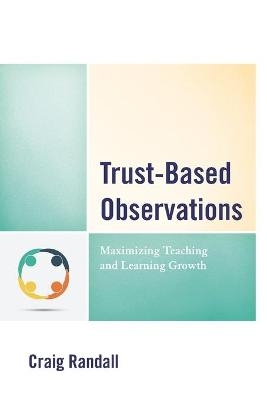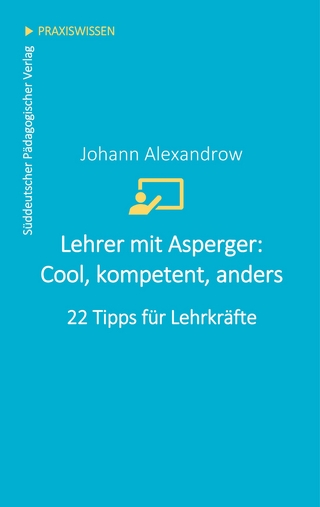
Trust-Based Observations
Rowman & Littlefield (Verlag)
978-1-4758-5356-8 (ISBN)
The results are in, observations are not improving teaching and learning. Pertinently, the Gates Foundation’s recently completed, seven year, $200 million effort to improve student outcomes through enhancing the teacher evaluation process failed to achieve substantive improvement. The reason is, observations as currently designed, serve as an obstacle to teacher risk-taking. Teachers play it safe because: 1) they fear negative evaluations when their pedagogy is rated, and 2) they lack faith in being supported by supervisors because a trusting relationship between them and their observer has not been sufficiently built.
There is a path though to using observations to dramatically improve teaching and learning, Trust Based Observations, a schema changing evaluation model that understands people perform at their best when they feel safe and supported. It begins with twelve, 20 minute observations per week followed by collegial conversations driven by reflective questions, sharing observed teaching strengths, and the building of safe, trusting relationships with teachers. Add the elimination of rating pedagogical skills, replace it with rating mindset, and teachers trust. Finally, have empowered teachers lead small professional development communities connected to good practice and teachers fully embrace risk-taking and innovation, leading to remarkable teaching transformations and improved student learning.
Craig Randall’s experience as a school counselor, coach, teacher, and principal, at schools in the US and overseas, set him up perfectly to develop a model of teacher observation focused on building trusting relationships that spark teaching and learning growth. As the founder of Trust Based Enterprises, www.trustbased.com, Craig is driven to guide school leaders to successfully adopt and use Trust Based Observations, on a path towards leading an unprecedented transformation to the way observation are done.
Table of Contents
Acknowledgments
Introduction
Part One: Observation Problems and Solutions
Chapter 1. So What’s the Problem?
What Can Be Done
Chapter 2. The Solution: Trust Based Observations
Build Safe, Trusting Relationships
Tweak Evaluation
Additional Solutions
Part Two: The TBO System and Making it Work
Chapter 3. The System Basics: Continuous, Frequent, Unannounced, and Short Observations
Why Unannounced?
Why a Continuous Cycle?
Why 20 Minutes?
Why Observe All Teachers Equally?
Troubleshooting
Chapter 4. Building System Success: Creating Time and Getting Organized
Creating and Prioritizing Time
Organization Tools
Part Three: The Observation
Chapter 5. Trust Based Observations Form: Origins and Development
Chapter 6. Starting an Observation
Chapter 7. Evidence of…
Early Thoughts to Guide Successful Observations
Evidence of
Learning Target (LT)
Risk Taking/Innovative Practice
Teacher/Student Rapport and Relationship
Classroom and Student Behavior Management
Cooperative Learning
Working Memory: 10-2 Reflection and Processing Time
Questioning/Higher Order Thinking
Formative Assessment/Knowing What Each Student Has Learned to Guide Next Steps
Descriptive Progress Feedback
Specific Differentiation
Learning Principles Used
Student Interview: (Is Learning Clear to All?)
Teaching Intangibles
Scripting
Additional Pedagogy
Questions
Suggestions
Chapter 8. Questions
Chapter 9. Web Links: Trust Based Observations as a Resource Tool
Part 4: The Reflective Conversation
Chapter 10. Reflective Conversation System Basics
Prioritize Reflective Conversations
Organization
Respect
The Conversation
Chapter 11. Building Trusting Relationships
Vulnerability
Empathy and Emotional Intelligence
Actions that Build Trust
Mindsets or Actions that Inhibit Trust
Chapter 12. Listening and Asking the Questions
Listening
The Questions
Chapter 13. Sharing Evidence of
Troubleshooting Additional Observer Questions on Sharing Evidence
Chapter 14. Offering Suggestions
When to Offer Suggestions
Preparation
What and How Much to Suggest
Words Matter: How to Offer Suggestions
Explaining What Continuing Support Looks Like and Entails
Troubleshooting Challenges to Offers of Suggestions
Chapter 15. Specials: Course Connections Accountability
Part Five: The Teacher Evaluation Process and Professional Development
Chapter 16. Self-Assessment: Trust Based Observation Form Rubric
TBO Pedagogy Rubric
Action Research Big Goal
Chapter 17. Evaluation in Trust Based Observations
TBO Evaluation
Preparing for the Summative Evaluation Meeting
The Meeting
Chapter 18. Action Improvement Plans and Difficult Conversations
Action Improvement Plans
Difficult Conversations
Chapter 19. TBO and Professional Development
Question of the Year PD
PDC and Action Research Big Goals
More on PDC’s
Further PD Tips, Suggestions, Guidelines
Part Six: Bringing It All Together
Chapter 20. Building TBO Success
Implementation
Blending
Change
Sustaining Success
Bibliography
About the Author
| Erscheinungsdatum | 10.05.2021 |
|---|---|
| Verlagsort | Lanham, MD |
| Sprache | englisch |
| Maße | 154 x 218 mm |
| Gewicht | 327 g |
| Themenwelt | Sozialwissenschaften ► Pädagogik ► Bildungstheorie |
| ISBN-10 | 1-4758-5356-4 / 1475853564 |
| ISBN-13 | 978-1-4758-5356-8 / 9781475853568 |
| Zustand | Neuware |
| Haben Sie eine Frage zum Produkt? |
aus dem Bereich


